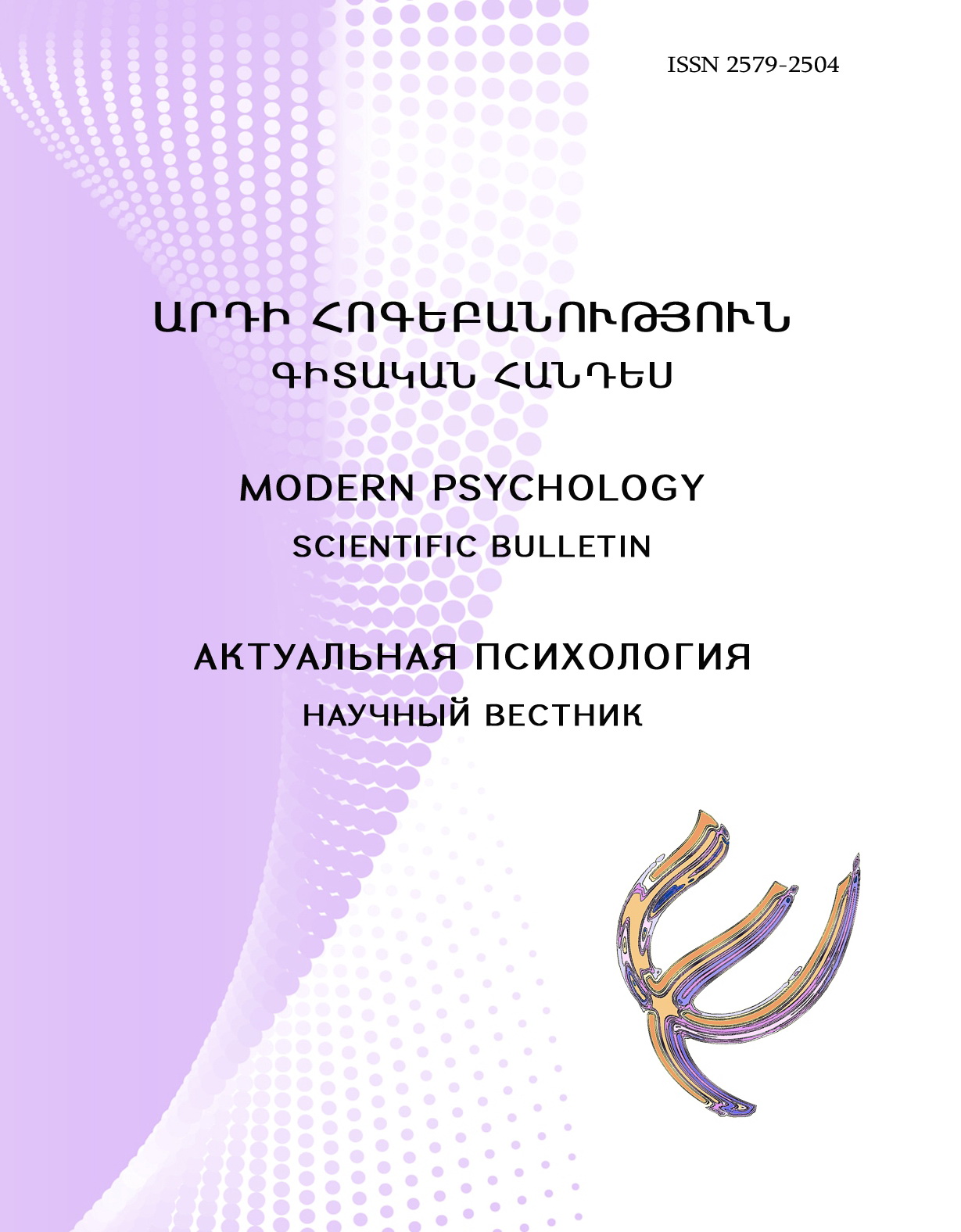ՄԱՆԿԱՎԱՐԺՆԵՐԻ ԿԱՐՈՂՈՒՆԱԿՈՒԹՅՈՒՆՆԵՐԻ ԲՆՈՒԹԱԳՐԻՉՆԵՐԸ ՆԵՐԿԱ ՃԳՆԱԺԱՄԱՅԻՆ ՊԱՅՄԱՆՆԵՐՈՒՄ
DOI:
https://doi.org/10.46991/SBMP/2023.6.2.069Keywords:
մասնագիտական կարողունակություններ, մանկավարժ, ճգնաժամային պայմաններ, անձնային պահանջմունք, սթրես, հետաքրքրություններAbstract
Հոդվածում ներկայացվում է մանկավարժների կարողունակությունների դերը, որն իր մեջ ընդգրկում է հոգեֆիզիոլոգիական դրսևորումները, անձնային պահանջմունքները, կարողությունները, ինչպես նաև հոգեկան ակտիվությունը, հետաքրքրությունը, հուզական տոնուսը, լարվածությունը և հարմարավետությունը։ Նշված գործոնները դիտարկվում են որպես անձի առավել կայուն բնութագրիչներ, հաշվի է առնվում նաև սթրեսի արտահայտվածությունը և դերը, որոնք ուղղորդում են անձի գործունեությունը և նպաստում կարողունակությունների ձևավորմանը: Հետազոտությունն իրականացվել է ՀՀ ինչպես քաղաքային, այնպես էլ համայնքային դպրոցների 162 մանկավարժների և բազմամասնագիտական թիմի աշխատակիցների շրջանում։ Տվյալներից վալիդության պահանջները բավարարել են 158 հետազոտվողների արդյունքները։ Հետազոտության արդյունքները փաստում են, որ կարողունակությունների ձևավորման և զարգացման գործընթացում կարևորվում են անձնային պահանջմունքները և հետաքրքրությունները:
Ներկայացված են կիրառվող մեթոդների բաղադրիչների հարաբերակցության վերլուծության արդյունքները և հաշվարկված է ուսումնասիրված գործոնների t-ցուցիչը։
References
Cipto Wardoyo, Yogi Dwi Satrio, Devi Aprlia Ratnasari, An analysis of teachers’ pedagogical and professional competencies in the 2013 curriculum with the 2017-2018 revision in accounting subject, REiD (Research and Evaluation in Education) 6(2), 2020, p. 142-149, https://doi.org/10.21831/reid.v6i2.35207
Guerrero, Dante, De los Rios, Ignacio, Professional competences: a classification of in-ternational models, Procedia – Social and Behavioral Sciences 46, 2012, p. 1291
Jefferey Sprenger, Stress and coping behaviors among primary school teachers, East Carolina university, 2011, p. 34-44
Kozlovskiy Y., Lievliev O., Mykytyuk O., Tiurina T., Dmytro Say, Features of formation of pedagogical competence of a university teacher in the leading countries of the world, Revista tempos e Espacos em Educacao, vol. 15, num 34, 2022, p. 16 https://doi.org/10.21831/reid.v6i2.35207
Linga T. Murthy, E-Education integrated teacher education and research, international journal of innovative research in advanced engineering, Issue 12, Volume 3, 2016, p. 24-28
Maksimovic J., Petrovic J., Osmanovic J., Professional competencies of future pedagogues, original scientific paper, 2015, p. 52-66, DOI: 10.17810/2015.05
Nick Panares, Ray Butch D. Mahinay, Mala Epra B. Magnaong, Classroom teachers’ 21st century skills in the K to 12 basic education curriculum implementations: Basis for policy review to increase NAT scores, ResearchGate, 2021, p. 1-10
Nessipbayeva O. The competencies of the modern teacher, Pre-service and In-service teacher training, 2012, p. 148-154
Papoyan V., Galstyan A., Sargsyan D., (2022). Transformation of Professional Psycho-social Competencies in Crisis Conditions: Bulletin of Yerevan University E: Philosophy, Psychology, 13(1 (37), p. 52–58. https://doi.org/10.46991/BYSU:E/2022.13.1.052
Papoyan V., Galstyan A., Sargsyan D., Karapetyan M., The role of the personality traits and motivation in manifestation in pedagogues' competencies, Bulletin of Yerevan University e: philosophy, psychology. vol. 14 N 1 (40) (2023), p. 55-63 https://doi.org/10.46991/BYSU: E /2023.14.1․055
Wan Hussin, 3-D stress management: Surveying the unexpected and mapping the ex-pected, 9th International Surveyors Congress, 2007, p. 34-44
21st century knowledge and skills in educator preparation, this paper has been produced as part of a collaborative project by the American Association of Colleges of Teacher Education and the Partnership for 21st Century Skills (P21), 2010, p. 40
Downloads
Published
How to Cite
Issue
Section
License
Copyright (c) 2023 Varduhi Papoyan, Diana Sargsyan, Alina Galstyan, Milena Karapetyan

This work is licensed under a Creative Commons Attribution-NonCommercial 4.0 International License.



